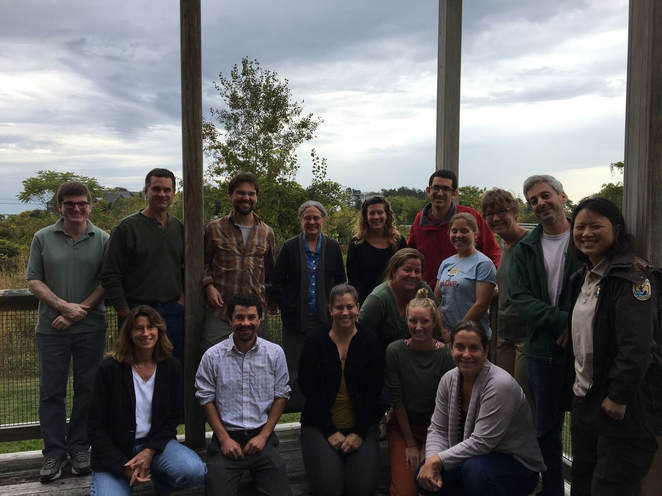 Participants in the 2017 Structured Decision Making workshop on predator control to benefit piping plovers. The workshop was held at Parker River National Wildlife Refuge.
Participants in the 2017 Structured Decision Making workshop on predator control to benefit piping plovers. The workshop was held at Parker River National Wildlife Refuge.
 Participants in the 2017 Structured Decision Making workshop on predator control to benefit piping plovers. The workshop was held at Parker River National Wildlife Refuge. Participants in the 2017 Structured Decision Making workshop on predator control to benefit piping plovers. The workshop was held at Parker River National Wildlife Refuge. The decision to decrease a population of one species to benefit another is often one of the most difficult in wildlife management. Predator removal has become a common tool for improving reproductive success of the piping plover, a threatened shorebird on the Atlantic Coast of North America. However each decision to remove predators from an ecosystem faces biological, economic, and political uncertainties. Such uncertainties must be addressed if decision makers are going to gain confidence in their policies, which is especially important when a decision may be controversial. Structured Decision Making (SDM) creates a framework for rationally evaluating alternative courses of action, such that all stakeholders can see the values that go into a decision, discuss the weights they attach to those values, and predict the outcomes of alternatives. In October, the Cohen lab participated in an SDM workshop focused on predator removal to benefit piping plovers and least terns on the Atlantic Coast. Biologists and wildlife managers from Maine and Massachusetts worked with SDM coaches, including Dr. Cohen and Ph.D. student Michelle Stantial, to address predator removal decisions in their respective states and to learn from common problems. Biological uncertainty became a centerpiece of the discussion, and the workshop resulted in a decision by one state to try and reduce the scientific uncertainty with a study using retrospective data and a prospective study design. In addition, the coaches developed a decision tool for site selection for predator control based on the following stakeholder values, the weights placed on those values by the workshop participants, and currently available data: number of plover fledges produced, number of other plover nesting sites benefiting from predator removal at treatment sites, and number of sites with least terns that would benefit. Although several areas of uncertainty remained to be addressed after the one-week workshop, the workshop helped to bring order to highly complicated issue and follow-up work is planned in to further refine the decision making process.
|
Categories
All
Archives
July 2019
|
 RSS Feed
RSS Feed
